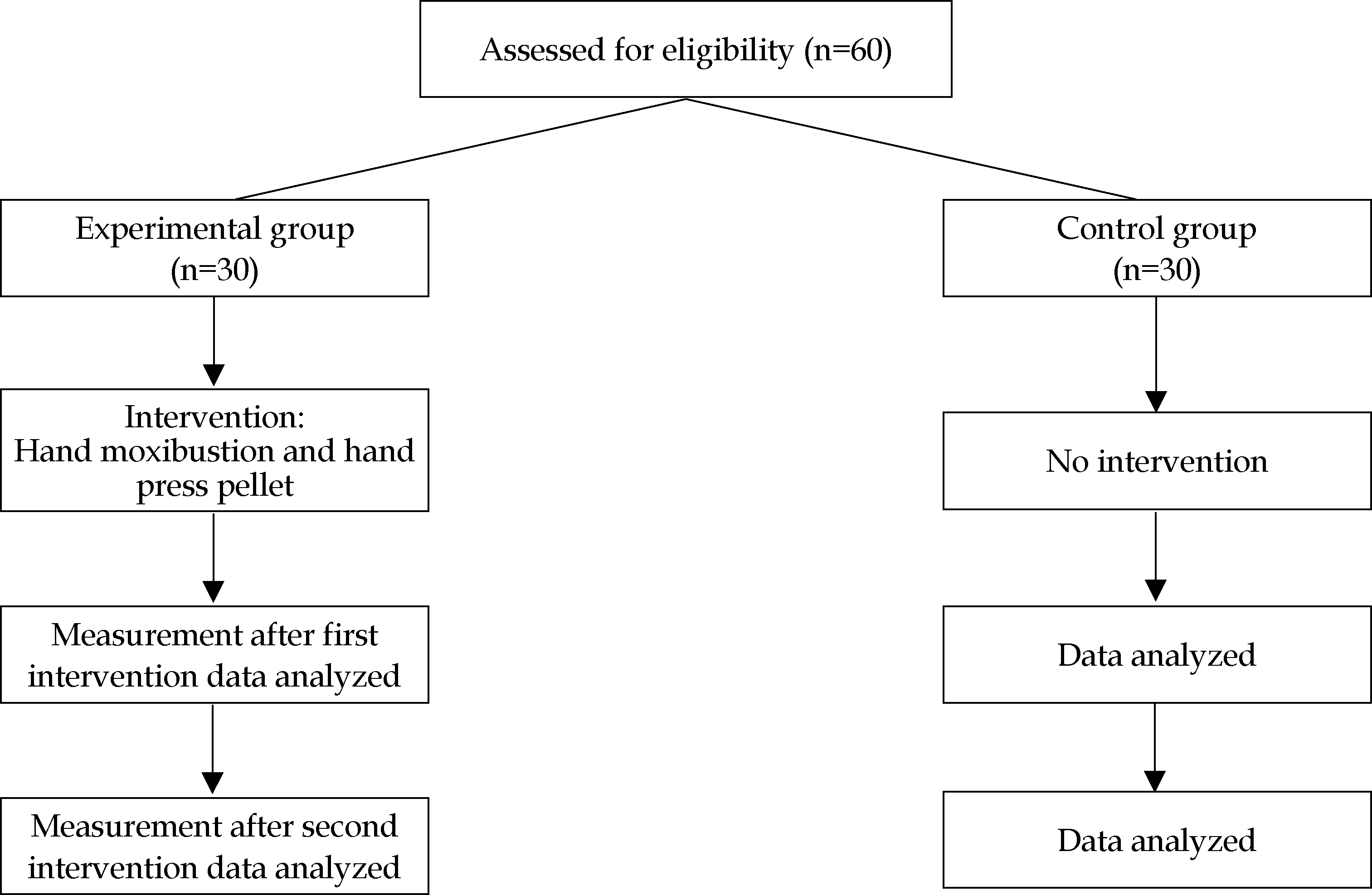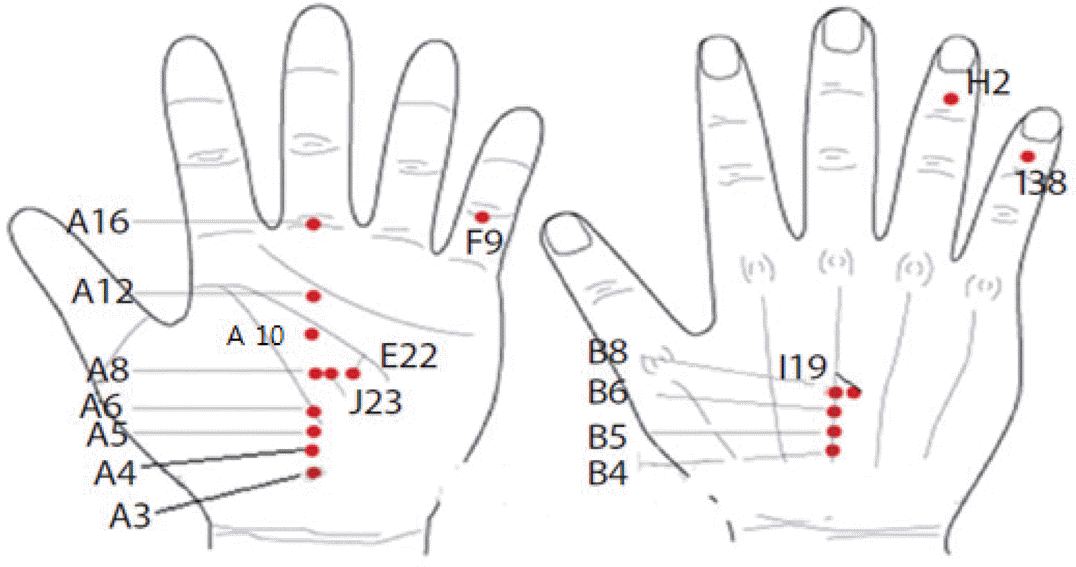Abstract
Purpose
This study tries to examine the effects of hand moxibustion and press pellet by applying them to male manufacturing workers with low back pain, and use them to develop nursing interventions for workers.
Methods
The data were collected from August to October, 2018, and the subjects were 60 men, processed by using SPSS/WIN 21.0 to perform homogeneity test with x2-, t-, and hypothesis tests with repeated measures, ANOVA and Scheffé test.
Results
Hypothesis 1 that “the experimental group provided with hand moxibustion and hand press pellet would give lower scores for low back pain than the control group” was supported (F=78.71, p<.001). Hypothesis 2 that “the experimental group provided with hand moxibustion and hand press pellet would have a wider range of motion than the control group” was also supported (F=17.44, p<.001). Hypothesis 3 that “the experimental group provided with hand moxibustion and hand press pellet would give lower scores for depression than the control group,” again, was supported (F=16.95, p<.001).
References
1. Kim JG, Kang JW. The characteristics of QuickDASH for workers in the manufacturing industry. The Journal of Korean Society of Occupational Therapy. 2013; 21(1):107–118.
2. Hoe VC, Urquhart DM, Kelsall HL, Sim MR. Ergonomic design and training for preventing work-related musculoskeletal disorders of the upper limb and neck in adults. Cochrane Database of Systematic Reviews. 2012; 15(8):1–73. https://doi.org/10.1002/14651858.CD008570.pub2.

3. Gallagher S, Heberger JR. Examining the interaction of force and repetition on musculoskeletal disorder risk: A systematic literature review. The Journal of Human Factors and Ergonomics Society. 2013; 55(1):108–124. https://doi.org/10.1177/0018720812449648.
4. Park JB, An SH. The effects of exercise on lumbar stabilization and a complex exercise in muscle, pains and index of disabilities in activities of chronic low back pain. The Korea Journal of Sports Science. 2017; 26(3):1019–1031.
5. Padma T, Balasubramanie P. Knowledge based decision sup- port system to assist work-related risk analysis in musculoskeletal disorder. Knowledge-Based System. 2009; 22(1):72–78. https://doi.org/10.1016/j.knosys.2008.07.001.
6. Yang JH. The effects of hand acupuncture therapy on pain, ROM, ADL and depression among elders with low back pain and knee joint pain. Journal of Korean Academy of Nursing. 2009; 39(1):10–20. https://doi.org/10.4040/jkan.2009.39.1.10.

7. Park SM, Kim HJ, Jang S, Kim H, Chang BS, Lee CK, et al. Depression is closely associated with chronic low back pain in patients over 50 years of age: A cross-sectional study using the sixth Korea National Health and Nutrition Examination Survey (KNHANES VI-2). Spine. 2018; 43(18):1281–1288. https://doi.org/10.1097/BRS.0000000000002595.
8. Toshinaga T, Ko M, Hiroki S, Jeffrey V. The impact of depression among chronic low back pain patients in Japan. BioMed Central Musculoskeletal Disorders. 2016; 17:1–9. https://doi.org/10.1186/s12891-016-1304-4.

9. Kothe R, Kohlmann T, Klink T, Rüther W, Klinger R. Impact of low back pain on functional limitations, depressed mood and quality of life in patients with rheumatoid arthritis. Journal of Hazardous Materials. 2007; 127(1-2):103–108. https://doi.org/10.1016/j.pain.2006.08.011.

10. Jegan NRA, Brugger M, Viniol A, Strauch K, Barth J, Baum E, et al. Psychological risk and protective factors for disability in chronic low back pain - a longitudinal analysis in primary care. BioMed Central Musculoskeletal Disorders. 2017; 18:1–11. https://doi.org/10.1186/s12891-017-1482-8.

11. Kim JM, Choi IA, Kim TW. Effects of spine muscle activation and pain improve to message of Weizhong (BL40) for dance major's chronic low back pains. The Korea Journal of Sports Science. 2015; 24(11):1411–1421.
12. Menta R, Randhawa K, Côté P, Wong JJ, Yu H, Sutton D, et al. The effectiveness of exercise for the management of musculoskeletal disorders and injuries of the elbow, forearm, wrist, and hand: A systematic review by the Ontario Protocol for Traffic Injury Management (OPTIMa) collaboration. Journal of Manipulative & Physiological Therapeutics. 2015; 38(7):507–520. https://doi.org/10.1016/j.jmpt.2015.06.002.

13. Cheon EY. The effect of a self-management program on physical function and quality of life of patients with knee osteoarthritis. Journal of Korean Academy of Nursing. 2005; 35(3):514–525.
14. Sok SR, Kim KB. Effects of muscle electric stimulation on chronic knee pain, activities of daily living, and living satisfaction for Korean elderly women. Journal of Korean Academy of Nursing. 2007; 37(3):305–312. https://doi.org/10.4040/jkan.2007.37.3.305.

15. Ha SW, Suh YO. Use of the complementary and alternative therapies, pain and quality of life in patients with chronic back pain. The Korean Journal of Rehabilitation Nursing. 2008; 11(1):5–12.
16. Westrom KK, Majers MJ, Evans RL, Bronfort G. Individualized chiropractic and integrative care for low back pain: The design of a randomized clinical trial using a mixed-methods approach. Trials. 2010; 11(1):11–24. https://doi.org/10.1186/1745-6215-11-24.

17. An YH, Kim YK. Effects of hands moxibustion therapy and hand press pellet on decreasing constipation among homebound elders. Korean Journal of Adult Nursing. 2012; 24(2):109–118. https://doi.org/10.7475/kjan.2012.24.2.109.

18. Koh HJ, Jung MK, Kwon YH. Effects of Koryo Hand Therapy (KHT) on woman elders' knee pain. Journal of the Korea Academia-Industrial cooperation Society. 2011; 12(9):4022–4029. https://doi.org/10.5762/KAIS.2011.12.9.4022.
19. Lee SM. A study on the management of the elderly's musculoskeletal disease by utilizing hand press pellet therapy. [mas-ter's thesis]. Asan: Sunmoon University;2016. p. 81.
20. Lee YO, Kim CN. The effects of hand acupuncture, moxibustion therapy on elders' shoulder pain, ADL/IADL and sleep disorders. Journal of Korean Academy of Community Health Nursing. 2010; 21(2):229–241. https://doi.org/10.12799/jkachn.2010.21.2.229.
21. Park JS, Woo SN, Yeo HJ, Kim KS. The effect of hand moxibustion therapy on knee joint pain, joint range of motion and discomfort during ADL in elderly people. Journal of Korean Academy of Fundamentals of Nursing. 2003; 10(2):244–253.
22. Jeon EY. Effects of the hand acupressure and lumbar strengthening exercise on women with lower back pain. Journal of East-West Nursing Reseach. 2013; 19(2):63–70. https://doi.org/10.14370/jewnr.2013.19.2.63.

23. Choi EH, Kwon KN. Effects of hand acupressure on blood pressure of older adults. Journal of Korean Gerontological Nursing. 2013; 15(2):112–119.
24. Beck AT. Depression: Clinical, experimental, and theoretical aspects. 1st ed. New York, NY: Harper & Row;1967. p. 370.
25. Lee YH. Study of the reliability and the validity of the BDI, SDS, and MMPI-D scales. The Korean Psychological Association. 1991; 15(1):98–113.
26. Lim NY, Yi YJ. The effect of Koryo hand-acupuncture on the patients with chronic low back pain. Journal of Korean Academy of Nursing. 2003; 33(1):79–86.
27. Choi SY. Pain treatment manual. Seoul: Shinheung Medscience;2012. p. 346.
28. Baik KJ. A study on the effect of Koryo Sooji Chim on the climacteric disorder of women in the middle age. [master's thesis]. Seoul: Chung-Ang University;2002. p. 41.
29. Hwang EH, Kim MY. A study on the effects of the hand acupressure therapy on sleep quality and mood state of insomnia adults. Journal of Korean Academy of Adult Nursing. 2008; 20(1):21–32.
Table 1.
Homogeneity Test for General Characteristics and Dependent Variables (N=60)
Table 2.
Difference in Low Back Pain, Range of Motion, Depression between Experimental Group and Control Group over Time




 PDF
PDF ePub
ePub Citation
Citation Print
Print




 XML Download
XML Download